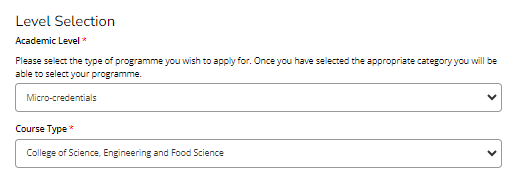| Code | NE6212 |
|---|---|
| Duration | 15 weeks |
| Teaching Mode | Part-Time. See Additional Teaching Mode Information for more info. |
| NFQ Level | Level 9 |
| Fees | €1,000 See Fees and Costs for full details. |
| Closing Date | 22/12/2025 |
| Venue | Blended delivery. |
| Credits | 5 |
| Start Date | 12th January 2026 |
Outline
Clean Energy Futures is a module that provides a deeper understanding of the complex challenges faced by societies, organizations, and individuals as we transition away from fossil fuels. How we live our lives and how we use energy are inseparable, and in this module, Ireland is examined as a test case for change. We explore how we currently heat our homes, fuel our transport, and generate electricity—and consider the options available for a cleaner, more secure future.
Through a multidisciplinary lens—spanning societal, scientific, engineering, and economic perspectives—the module investigates both the challenges and opportunities involved in reshaping our energy use. With a national focus, it is particularly suited to those working in environmental policy, national energy strategy, or climate-related fields who wish to broaden their understanding and connect diverse perspectives on building a cleaner future.
Module Goal
- to apply systems thinking to understand the complexity of energy use in our society, environment and economy.
- to understand the inherent uncertainties and natural tensions when planning future energy systems arising from different local and global perspective.
- To have an improved energy and climate literacy and understanding for core economic and environmental drivers of future change
Additional Teaching Mode Information
- 12 x 2Hr(s) Lectures
- 2 x 2Hr(s) Tutorials
Practicalities
Practicalities
Total Marks - 100.
- Written Examination in UCC - 60 marks
- Continuous Assessment - 40 marks
Why Choose
On successful completion of this module, students should be able to:
- Understand the key concepts, drivers, opportunities, and risks associated with our current and future energy use.
- Describe the interrelationships between energy affordability, security and environmental sustainability.
- Demonstrate knowledge of energy and climate policy at EU and National (Irish) level.
- Demonstrate ability to critically evaluate outcomes, learning and results from different energy futures.
- Engage and listen intelligently to various non-technical and technical discussion on future energy choices.
Skills and Careers Information
Learning Pathway:
Students completing this Micro Credential gain 5 credits exemption from the PG Cert in Offshore Renewable Energy.
Read more about that programme here PG Cert Offshore Renewable Energy
Requirements
Applicants must have:
- A Second Class Honours Grade 2 (or equivalent) in a primary honours degree (NFQ Level 8) in any discipline
of Engineering OR - a Second Class Honours Grade 2 (or equivalent) in a primary honours degree (NFQ Level 8) in areas of science
that required having completed level 8 mathematical subjects deemed equivalent to those of engineering (e.g. Physics, Mathematical Sciences, some Computing Science degrees), pending assessment by Programme Director OR - a pass in any accredited level 8 Engineering degree followed by professional experience deemed of sufficient added value, pending assessment by the Programme Director.
A quota will be allocated to applicants who do not meet these entry requirements. These applicants will be considered under Recognition of Prior Learning and assessed on the following factors:
- Academic achievement
- Prior Work Experience
- Letter of Reference
- Personal Statement
Fees and Costs
The fee for this micro-credential is €1,000.
How To Apply
Please select the following options during your online application (once you have created your profile)
Start a new Micro-credentials application by selecting as below

In the application level tab select the options below and then select the programme/module you'd like to apply for

